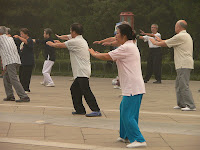
Whenever you're concerned with improving your health, you first want to consider the obvious and most serious factors, such as improving diet, getting enough exercise and avoiding known unhealthy habits and substances. Once you have those things out of the way, you want to put on the finishing touches on your health. That is, once you've made yourself 90% healthy, these things will help make you that few percentage points
more healthy. Some of these things including refining your diet, exercise routines and sleep patterns even more, getting good things like massage, avoiding more toxins in your environment, reducing stress and increasing happiness.
Nudism is another one of these "finishing touches". The ways it benefits are varied. Being nude (in a safe, warm environment) can be very health for the skin, reducing the likelihood of fungal infections, bacterial infections, various clothing irritations. For some skin conditions, nudity and sunlight is actually perscribed by physicians. Psoriasis is a well-known example. Exposure to sunlight or the right wavelengths of artificial U.V. light is known to help psoriasis, slowing the overgrowth of skin cells, sometimes with
dramatic results.
So how can one get nude often? One way is in the home, if those who live with are tolerant. If not, you might at least find a room of the home where you can be alone and nude while reading a book, exercising or other activity. If you happen to have a private backyard, you are lucky to have a place where you can sunbathe nude. If not, you may look for an area
nudist resort or beach.
Exercising nude is a great way to exercise. Not only do you have geater freedom of movement, but when you get really sweaty, your perspiration can cool you exactly how nature intended, rather than your body temperature rising to dangerously high levels. Even when not exercising, nudity can help regulate the body's temperature in hot and humid environments, which is of course why natives in hot, humid tropical forests go nude or nearly nude. It's not just their culture - nudity is a practice of their culture because it works for them and keeps them alive.
Of course, be moderate with sunlight. Depending on your skin tone and other factors you may be more or less sensitive to the sun. If you get sunburned, you've clearly had too much for that day! It's known that too much sun can lead to skin cancer, but no sunlight is not healthy as well. In fact, recent studies have shown that high vitamin D intake (and you can get naturally-provided vitimin D from the sunlight) at least slight protection against colon and breast cancers.
Obviously there are some situations where nudity is not healthy or at least not recommended, like when it's too cold or at some unathorized place where you might be arrested or gawked at. But if you can find a safe place, nudity has much to offer your heath and sanity!














